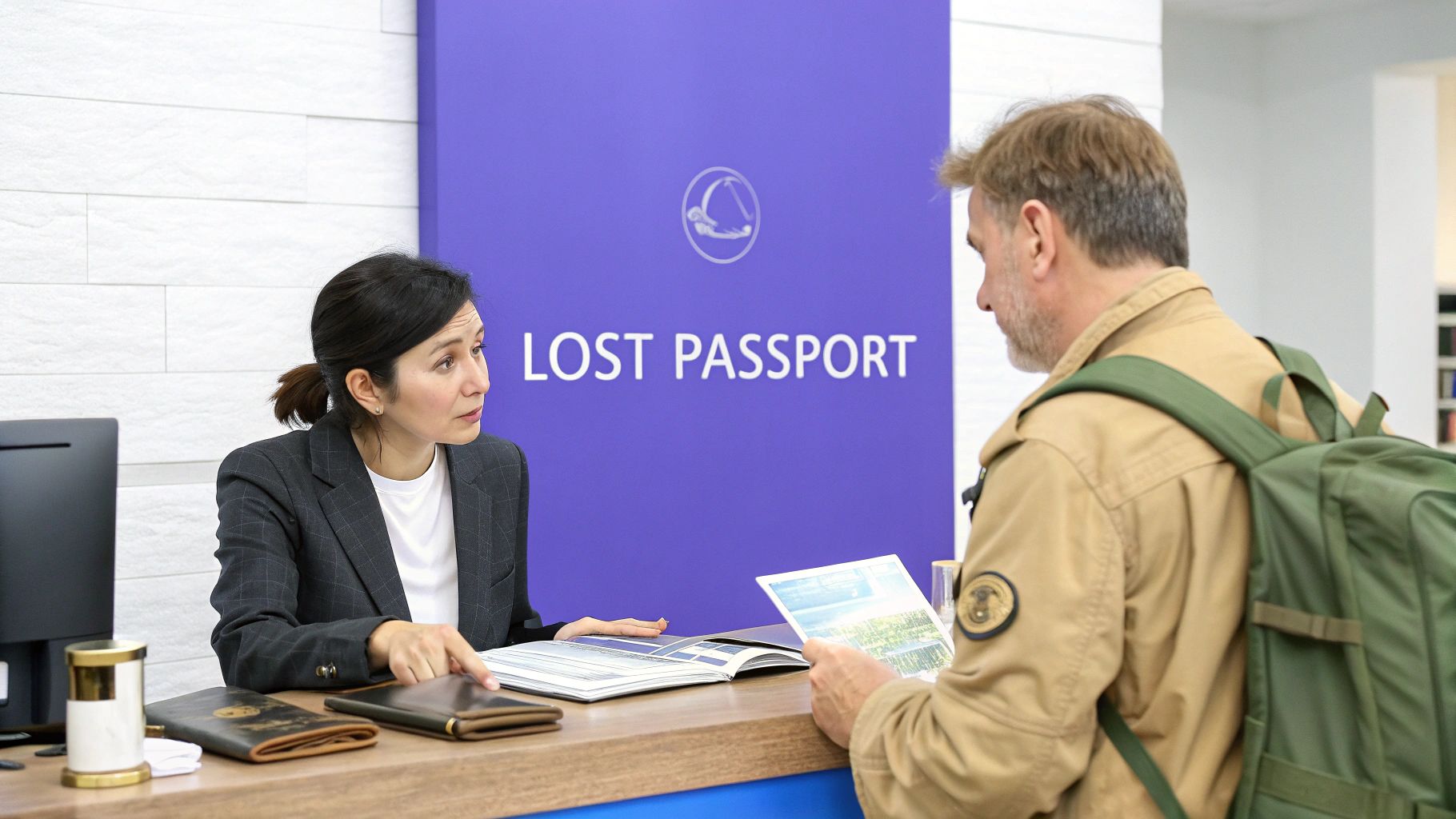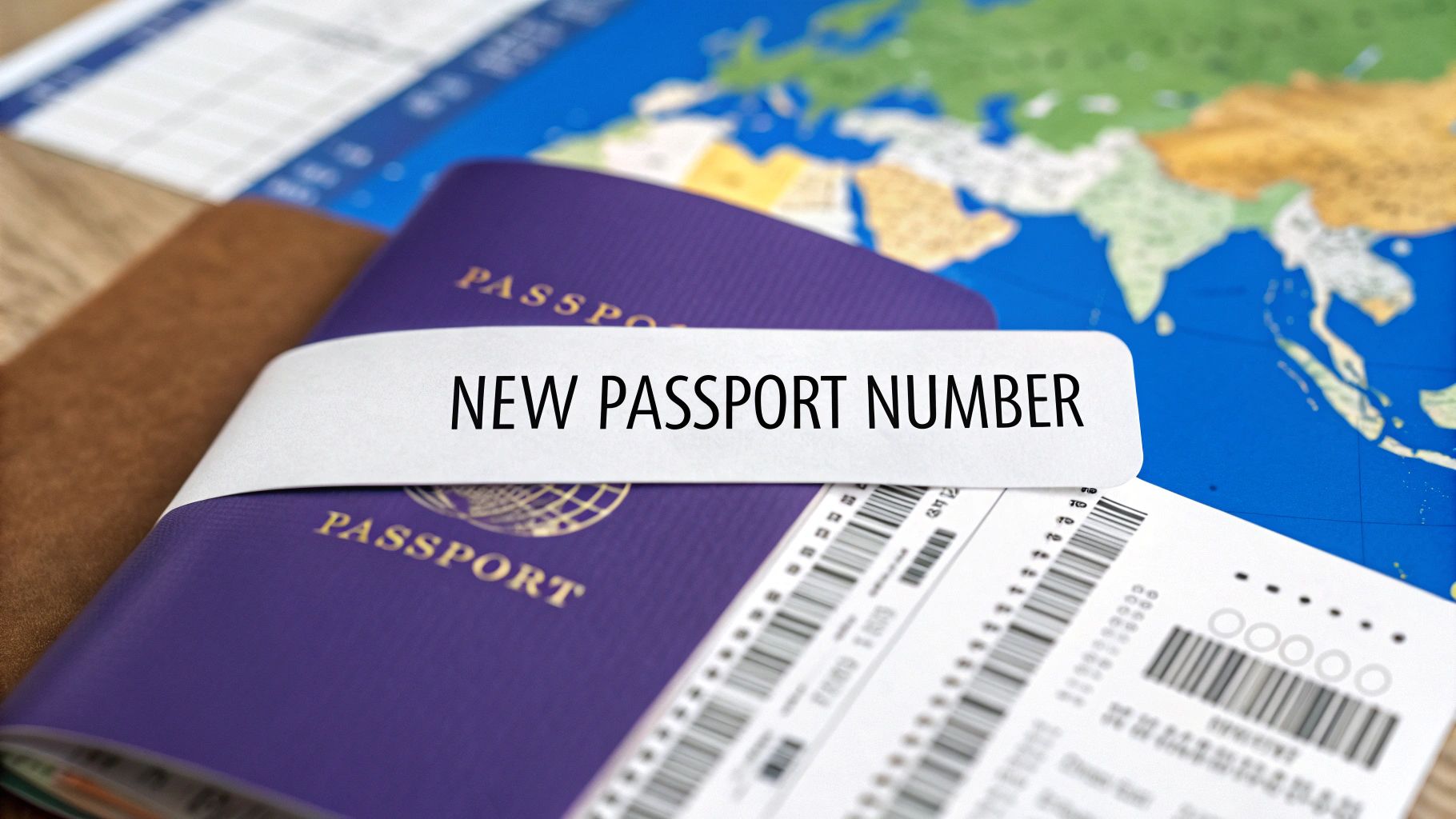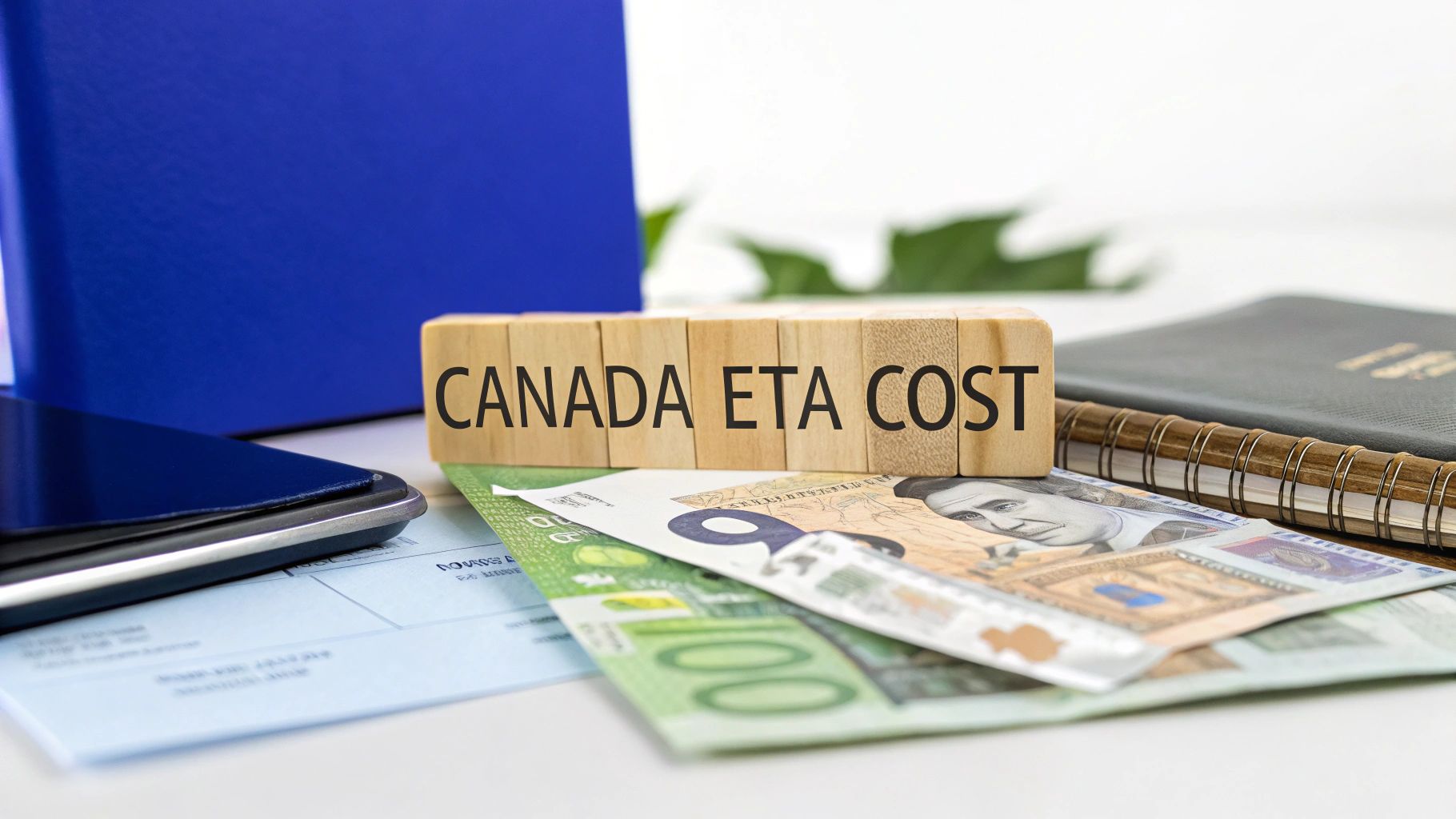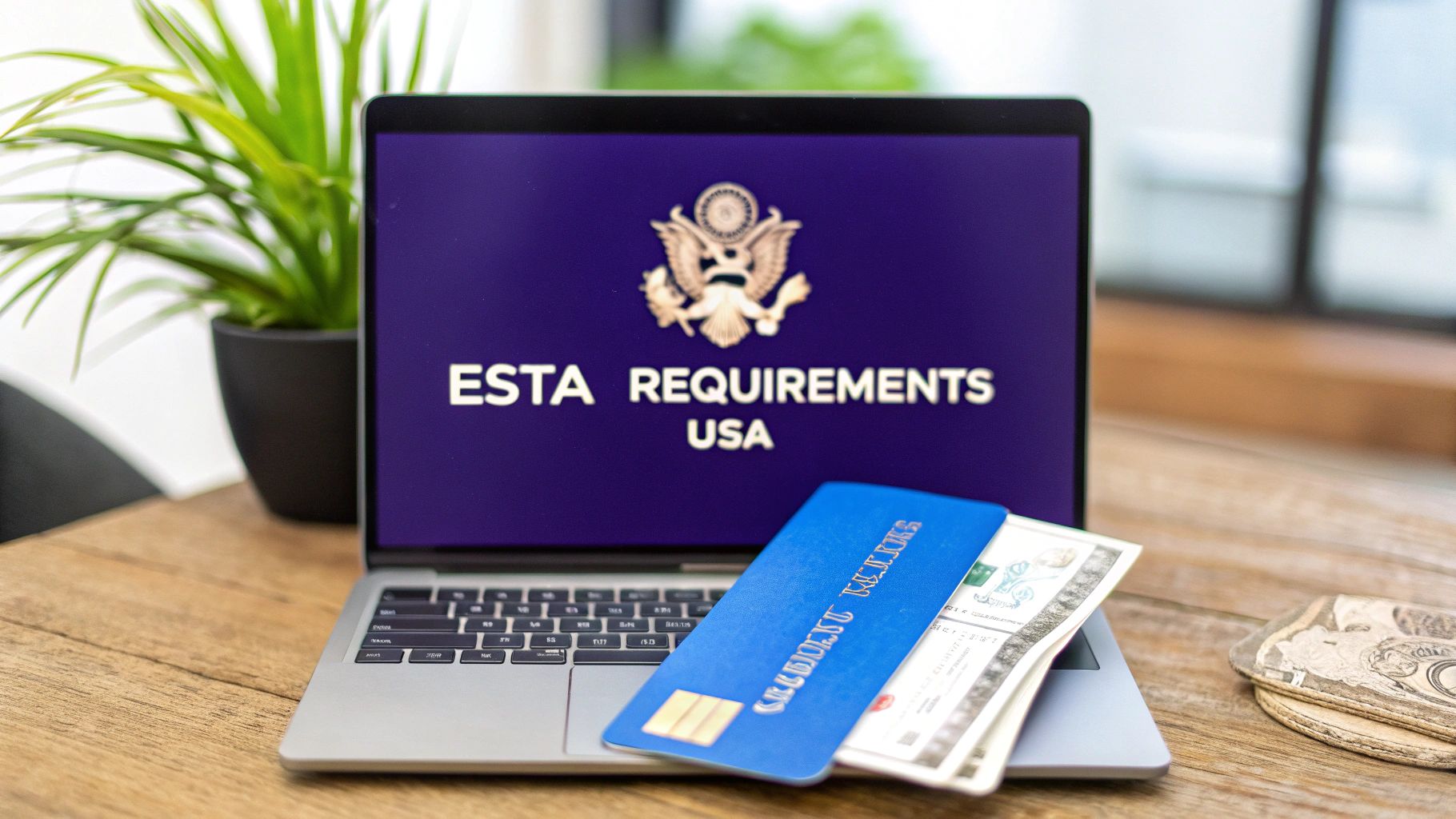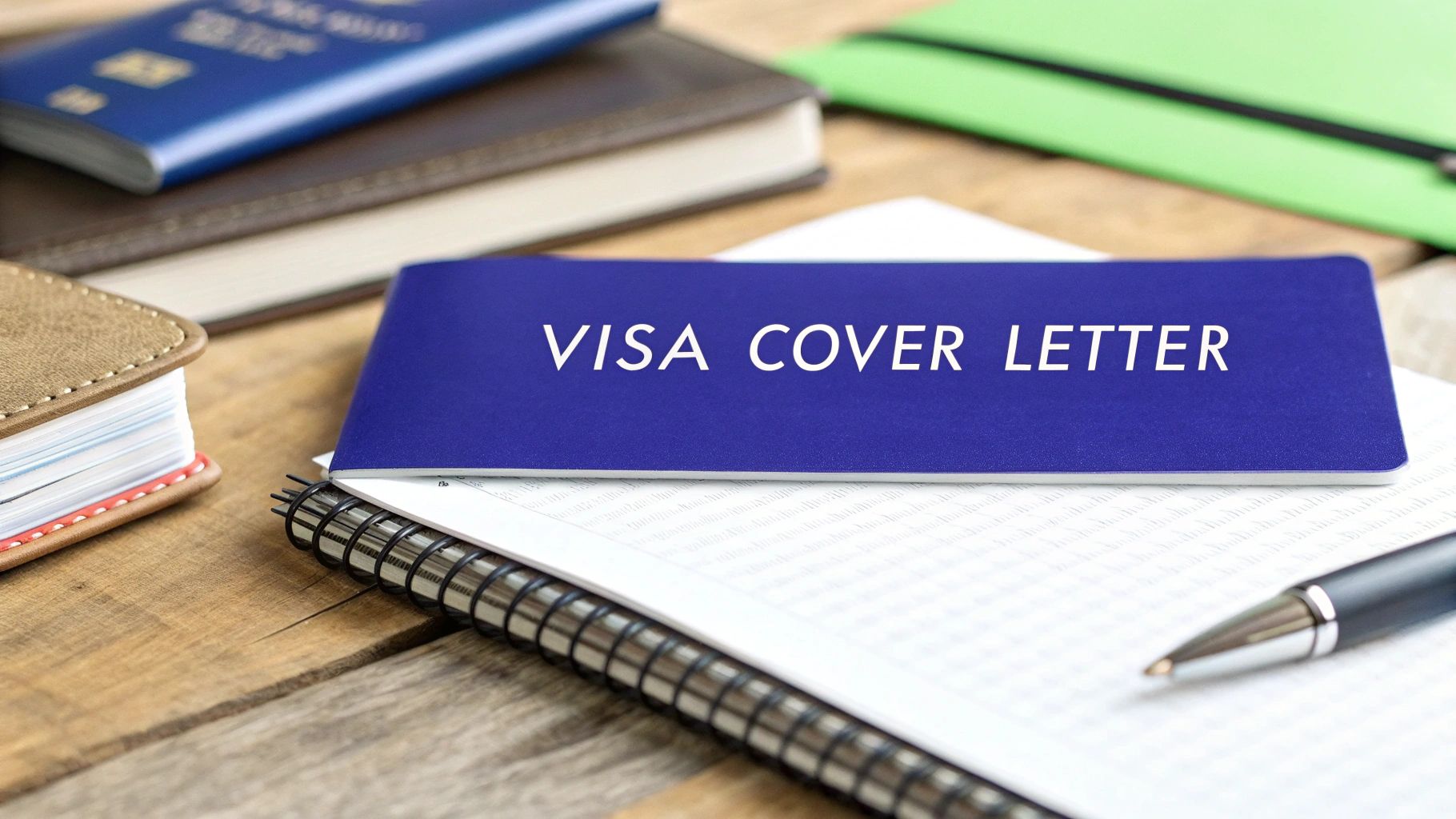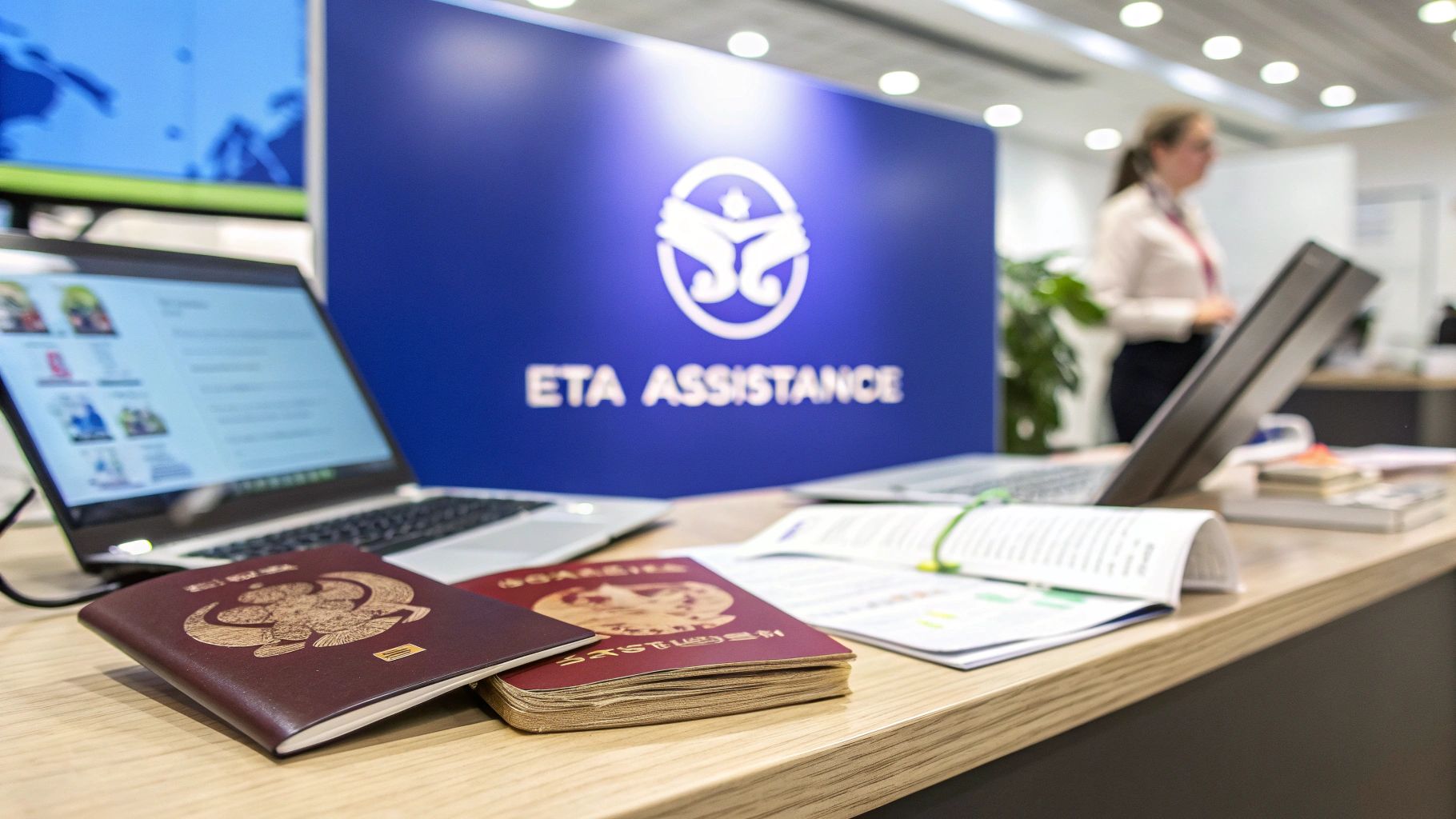
UK Visa Requirements: Your Essential Guide to Requirements UK Visa
Figuring out the requirements for a UK visa can feel like a maze. It really comes down to one big question: do you need a full-blown visa, or will the much simpler Electronic Travel Authorisation (ETA) do the trick? Your answer depends on your nationality, why you're visiting, and how long you plan to stick around.
Visa or ETA: Understanding Your Path into the UK
Choosing between a UK visa and an ETA is the very first thing you need to sort out. Think of it like picking a key for a lock—grab the wrong one, and you're just setting yourself up for delays and a whole lot of frustration. The UK government has two separate systems for a reason, each built for a different kind of traveler.
An Electronic Travel Authorisation (ETA) isn't actually a visa. It's a digital green light to travel, designed for short-term visitors from certain visa-exempt countries. If you're coming for a holiday, to see family, or for a quick business meeting, this is likely your route. The whole process is online, fast, and you’ll usually get a decision in just a few days.
On the other hand, a traditional UK visa is a formal stamp in your passport. You'll need one for longer stays, for specific reasons like work or long-term study, or if you're a citizen of a country that isn't on the ETA-eligible list. The application is much more involved, often requiring biometrics, a mountain of paperwork, and significantly longer waiting times.
Key Differences at a Glance
The real difference boils down to your plans and how long they'll take. Planning a two-week holiday from an eligible country? The ETA is your friend. Moving to the UK for a new job? You're going to need a proper work visa.
For a deeper dive into travel permissions, feel free to check out our detailed guide on the travel visa for UK. Getting this right is the cornerstone of meeting the necessary requirements for a UK visa.
To give you a clearer picture, this image breaks down the requirements and timelines for two of the most common formal UK visas.
As you can see, formal visas like the Skilled Worker and Student routes come with hefty income requirements and can take weeks to process. It really highlights how much more complex they are compared to the straightforward ETA system.
To help you decide which one you need, here's a quick comparison.
UK Visa vs UK ETA At a Glance
This table breaks down the main differences between a standard UK visa and the new ETA, so you can see which one fits your travel plans.
| Feature | UK Visa | UK ETA |
|---|---|---|
| Who Needs It | Nationals of non-visa-exempt countries; for work, long-term study, or settlement. | Nationals of specific visa-exempt countries for short-term visits. |
| Application Process | Detailed online form, biometrics appointment, extensive documentation. | Simple online form, digital photo uploads. |
| Purpose of Visit | Long-term stays, work, extended study, family settlement. | Tourism, business meetings, visiting family, short study (under 6 months). |
| Processing Time | Several weeks to months. | Typically within 3 business days. |
| Cost | Varies by visa type, often several hundred to thousands of pounds. | Low, fixed fee. |
| Validity | Varies based on the visa type (e.g., 3 years for a work visa). | 2 years, allowing multiple visits of up to 6 months each. |
In short, the ETA is for quick, simple visits, while a full visa is for anyone planning to stay longer or for more specific, involved reasons like work or school.
Making the Right Choice for Your Trip
To figure out which one is for you, just ask yourself these three questions:
- What's my nationality? Check if your country is on the UK's visa-exempt list. If it is, you're probably an ETA candidate.
- Why am I going? Is it for a holiday, visiting friends, or a short conference? That’s ETA territory. If it's for a job, long-term schooling, or moving there, you’ll need a visa.
- How long am I staying? The ETA covers stays up to six months. If you need more time, a visa application is in your future.
Trying to figure out these rules can be a headache, and even a tiny mistake on an ETA application can cause delays. For travelers who want a smooth, error-free process, a third-party application assistance provider can help. They review all your details to make sure they're right, giving you the best shot at approval.
Understanding the UK Electronic Travel Authorisation

Think of the UK's new Electronic Travel Authorisation (ETA) as a digital permission slip for your trip. It's not a visa, but it is a mandatory requirement for visitors from certain countries who previously didn't need a visa for short stays. It's essentially a quick pre-screening that makes your journey smoother and keeps the UK border secure.
The system is gradually being rolled out to more countries, so it's changing how a lot of people plan their UK travels. Once your ETA is approved, it’s valid for a full two years, allowing you to make multiple trips to the UK. For each visit, you can stay for up to six months.
Who Needs a UK ETA?
If you're a citizen of a country that is "visa-exempt" for the UK, you'll almost certainly need to get an ETA. In simple terms, if you could previously pop over to the UK for a short holiday without a visa, you'll now need an ETA before you travel.
The list of required nationalities is expanding, and it's expected to eventually include citizens from the US, Canada, Australia, New Zealand, and most of Europe.
An ETA is a digital permission to travel—it is not a visa and does not permit entry into the UK on its own. It simply authorises a person to travel to the UK, where a Border Force officer will make the final decision on entry.
It's really important to check the official list of eligible nationalities before you book anything, as the rules are changing. British and Irish citizens are exempt, and you won't need one if you already have a valid UK visa or another form of immigration status. For more details, our guide on the UK ETA visa breaks it all down.
What Can You Do With an ETA?
An ETA is designed for specific short-term trips. Knowing what's allowed is key to a smooth, hassle-free visit and staying on the right side of the requirements uk visa rules.
With an approved ETA, you're cleared for:
- Tourism: Holidays, sightseeing, and exploring everything England, Scotland, Wales, and Northern Ireland have to offer.
- Visiting Family and Friends: Catching up with loved ones who live in the UK.
- Business Activities: Attending meetings, conferences, or negotiations. Just remember, you can't take on paid work for a UK company.
- Short-Term Study: You can take a course that lasts up to six months, as long as it's with an accredited institution.
What's not allowed? You can't use an ETA to work for pay in the UK, claim public funds (benefits), or live here long-term.
What You'll Need for Your Application
The online application is designed to be user-friendly, but it demands complete accuracy. Even a tiny typo can cause delays or even a rejection, which is a headache no one needs.
To apply for a UK ETA online, you’ll need to have these things ready:
- Valid Biometric Passport: It must be from one of the ETA-eligible countries.
- Digital Passport Photo: A clear, recent photo that meets the UK's specific digital image standards.
- Contact Information: A working email address is crucial, as this is where your ETA confirmation will be sent.
- Travel Details: You don't need to have flights booked, but you'll be asked about your general travel plans.
- Payment Method: A credit or debit card to cover the application fee.
While the process seems simple, small mistakes are incredibly common. For travelers who want total peace of mind, using a trusted third-party application assistance provider like AssistEntry is a smart move. Our experts perform a full verification and error-checking on your application before it's submitted.
This service, with prices starting from $79 (it include government fee, all cost included), increases your chances of approval due to expert handling. To simplify your ETA application and increase your chances of approval, consider using AssistEntry — their experts guide you through the entire process, starting from just $79.
Key Requirements for Common UK Visas
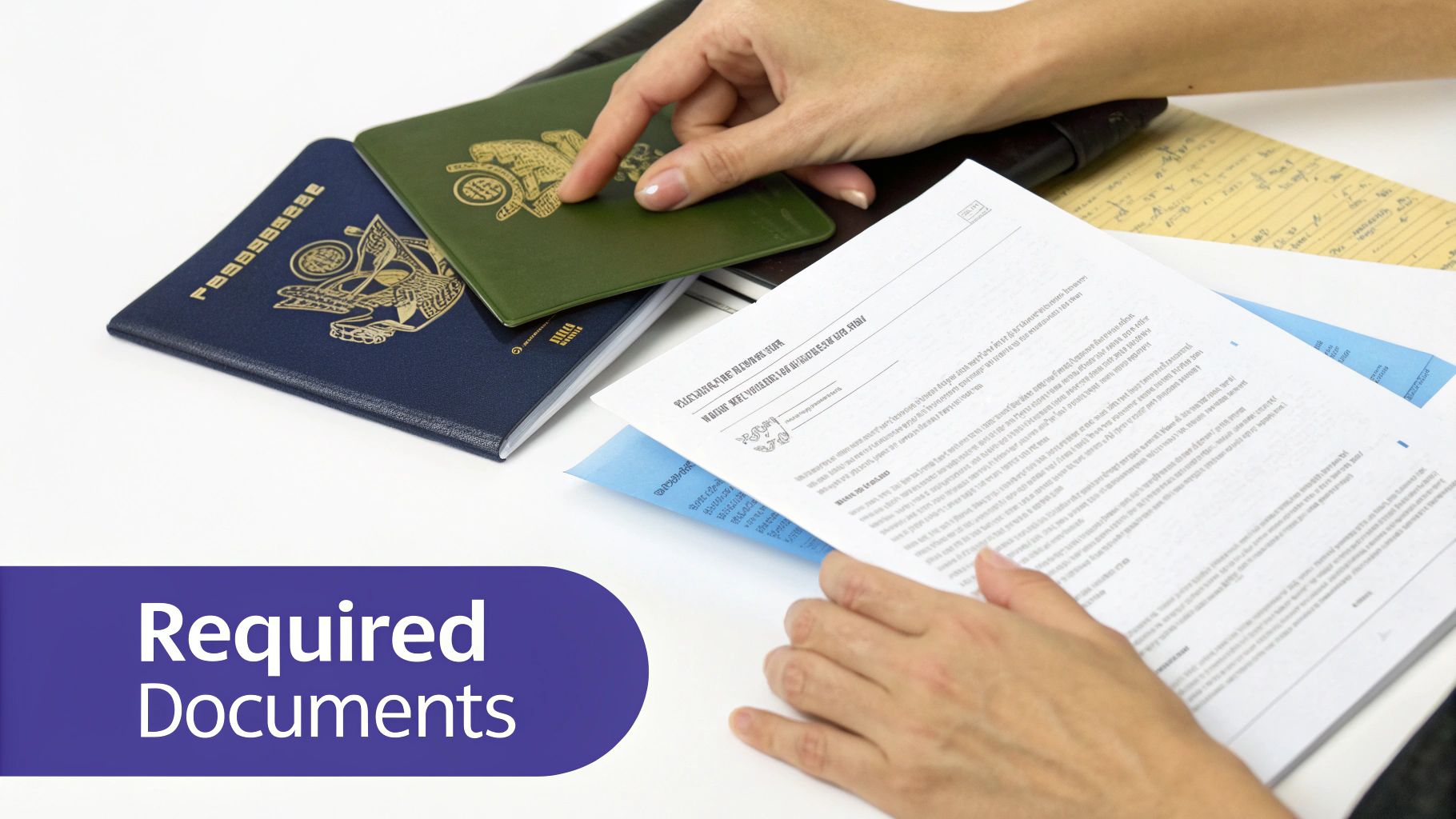
While the Electronic Travel Authorisation (ETA) is a simple solution for short trips from certain countries, many travellers will need to go through the formal UK visa process. Diving into the specific requirements uk visa rules can feel like a huge task, but when you break them down, it all becomes much clearer.
Every visa is built for a specific purpose—whether that’s a holiday, a new job, or starting a degree. The first step to a successful application is simply understanding the core criteria for the visa you need.
The Standard Visitor Visa
This is the go-to visa for tourism, visiting family, or attending short business meetings if you're not eligible for an ETA. The whole point of this application is to convince the Home Office your visit is genuine and that you have every intention of leaving the UK when you say you will.
To get the green light, you’ll need to prove a few key things:
- Proof of Funds: You must show that you have enough money to cover your entire trip without needing to work or access public funds. Bank statements are the standard way to do this.
- Ties to Your Home Country: This is a big one. You need to provide solid evidence that you have a reason to go back home, like a steady job, family, or property you own.
- Genuine Visitor Intent: Your application has to tell a believable story. A detailed travel plan or letters of invitation can really help show that your reasons for visiting are legitimate.
Think of it as painting a picture for the visa officer. You're a legitimate visitor who can afford the trip and will definitely return home. For a full rundown, check out our guide on essential UK visa documents.
The Skilled Worker Visa
For professionals looking to work in the UK, the Skilled Worker Visa is the main route. The requirements here are much tighter and are linked directly to your job offer. Post-Brexit rules have made the criteria for work visas tougher than ever.
Since July 2025, the goalposts have moved. The minimum skill level for most jobs is now RQF level 6 (equivalent to a bachelor's degree), and the general minimum salary threshold jumped from £38,700 to £41,700 a year. You can read the full research about visa applications to see the official details.
Here’s what you absolutely must have:
- A Job Offer: You need a confirmed job offer from a UK employer who is approved by the Home Office to sponsor workers.
- Certificate of Sponsorship (CoS): Your employer gives you this. It's a unique reference number with all the key details about the job.
- Appropriate Salary: Your pay must meet the specific minimum for your job role.
- English Language Proficiency: You’ll have to prove your English skills by passing an approved test.
This visa is really a three-way agreement between you, your employer, and the UK government. Each piece of evidence builds on the last to confirm you’re the right person for the job.
The Student Visa
If you're an international student heading to the UK for your studies, the Student Visa is your ticket in. The application hinges on your acceptance to an approved school, college, or university.
The Student Visa uses a points-based system. You need to score 70 points to qualify. These points are awarded for having a university offer, showing you have enough money, and meeting the English language requirement.
The main documents you'll need to gather are:
- Confirmation of Acceptance for Studies (CAS): This is an electronic document from your university. It's the most important part of your application.
- Financial Evidence: You must prove you can pay for your course fees for the first year and cover your living costs.
- English Language Skills: Just like with the Skilled Worker Visa, you'll need to prove you have a good command of English.
Getting these requirements uk visa details right is what opens the door to your UK education. Each document plays a role in proving you're a genuine student ready to start your academic journey.
Current Trends in UK Visa Approvals
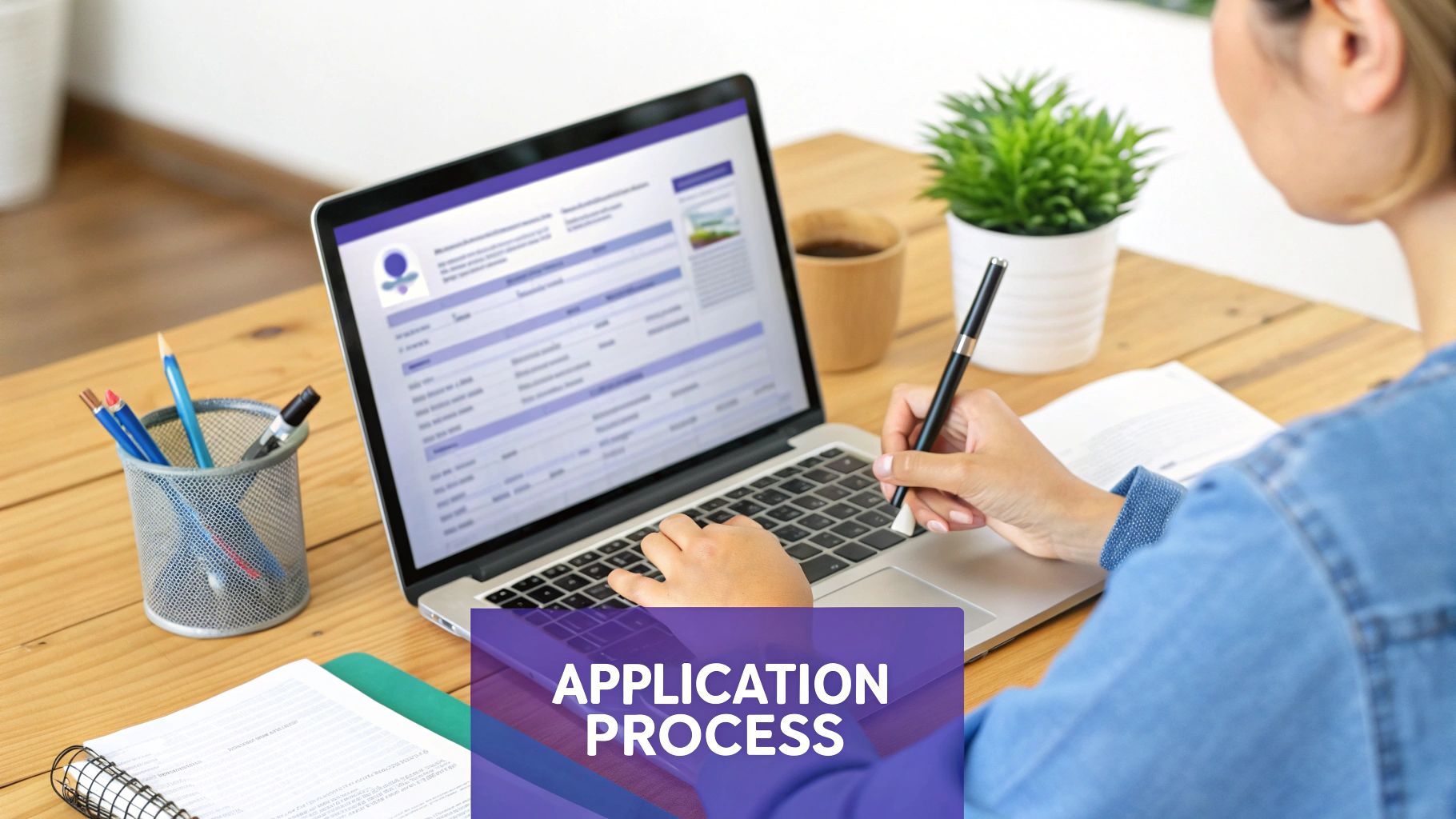
Think of it like checking the weather before a big trip—knowing the current UK immigration climate helps you prepare for what’s ahead. The UK's visa rules aren't set in stone; they change with economic needs, political shifts, and global events. Paying attention to these trends gives you a real edge, showing you which routes are getting tougher and where new opportunities might be opening up.
Recent data confirms what many have suspected: the UK immigration system is in the middle of some major adjustments. These policy changes have a quick and direct impact on visa approval rates. So, if you're getting ready to meet the requirements uk visa rules demand, understanding these shifts is key to managing your expectations and building a smart application strategy.
Shifting Tides in Work Visas
One of the biggest changes we've seen is a major tightening in the work visa category. The government has brought in stricter rules, causing a noticeable drop in approvals for certain jobs, especially in sectors that used to see a high volume of applicants.
For the year ending June 2025, the Home Office granted around 182,553 work-related visas to main applicants. That’s a sharp 36% decrease from the year before. The Health and Care Worker visa took a particularly hard hit, with approvals plummeting by 77%. This was driven by huge drops of 88% in caring personal service roles and 80% in nursing professionals. You can discover more insights about these immigration shifts to get the full story.
This isn't random—it points to a clear policy shift aimed at reshaping the UK workforce, making it much more challenging for certain professions to get a visa.
The Rise in Student and Visitor Approvals
While the work visa path is getting narrower, other areas are looking more positive. Study visas, for example, have bounced back, especially for students coming from countries like India and Nigeria. This shows the UK is still very keen on welcoming international students to its universities.
Visitor visas and Electronic Travel Authorisations (ETAs) generally have stable approval rates, as long as you tick all the boxes. But even with a seemingly simple UK ETA application, getting every detail right is crucial. The system is built for speed, which means there’s no room for mistakes.
A successful application is about more than just being eligible. It’s about presenting a clear, accurate, and convincing case. Knowing the latest approval trends tells you exactly where the Home Office is focusing its attention and scrutiny.
What These Trends Mean for You
So, what do you do with this information? Think of it as insider knowledge. It helps you see potential roadblocks ahead of time and focus on making the weaker parts of your application stronger.
Here’s how you can use these insights:
- Applying for a work visa? Double- and triple-check the salary and skill level requirements. These are the areas getting the most scrutiny right now.
- Applying for a student visa? Make it crystal clear that your primary goal is to study and that you have the funds to support yourself. These are still the most important factors.
- Applying for an ETA? The process is simple, but don't get complacent. Precision is everything. Check every single detail before you hit submit.
Navigating these changes can feel overwhelming. A tiny mistake on what looks like a straightforward form can cause big delays or even a denial. To sidestep the common traps and make sure your application is perfectly aligned with what the Home Office wants to see, getting an expert to look it over can be a game-changer.
For travelers who need a UK ETA, using a third-party application assistance provider can make all the difference. To simplify your application and boost your approval chances, check out AssistEntry. Starting from just $79, their experts walk you through the whole process. Their full verification and error-checking service ensures your application is flawless, giving you the best shot at getting approved quickly.
Avoid Common Application Mistakes
A simple oversight on your application can unfortunately lead to frustrating delays or even an outright denial. Getting a UK visa or ETA is all about the details, and tiny errors can have surprisingly big consequences. The first step to a smooth approval is knowing what trips people up the most.
From incomplete forms to simple typos, the people and systems reviewing your application are trained to spot inaccuracies. These mistakes don't just slow things down; they can raise red flags about your credibility, making the whole process more stressful than it needs to be.
Incomplete or Inconsistent Information
One of the most common reasons for rejection is an application with missing information or details that don’t line up across your documents. It could be as simple as forgetting to fill out a section or providing a travel history that contradicts a past visa application.
Consistency is everything. The story you tell on your application form, in your bank statements, and in your supporting letters must be clear and identical.
For ETA applicants, accuracy is even more critical.
- Passport Number Errors: A single wrong digit in your passport number can make your ETA completely invalid. You have to double-check this.
- Incorrect Dates: Mismatched birth dates or passport expiry dates are frequent mistakes that cause an automatic rejection.
- Name Mismatches: Make sure the name you enter is an exact match for the one on your passport, including any middle names.
These might feel like small details, but the automated ETA system depends on perfect data matching to work.
Failing to Meet Financial Requirements
For formal visa applications, not providing proper proof of funds is a huge stumbling block. You must clearly show that you can support yourself for your entire trip without needing to access public funds.
This means providing clear, easy-to-read bank statements that show a stable financial history—not just a large, recent deposit that could look suspicious. The money also has to be yours to access freely.
A common mistake is thinking a letter from a sponsor is enough on its own. You absolutely must back it up with hard financial evidence showing your sponsor has the money and is willing to support you during your visit.
Missing Key Deadlines and Documents
Every UK visa application runs on a strict schedule with a specific list of required documents. Submitting your application too late or forgetting to include something mandatory, like a tuberculosis test certificate if you need one, will almost certainly lead to an automatic refusal.
Create a personal checklist and a timeline. Mark down the deadlines for submitting your application, giving your biometrics, and any other important dates. For a detailed rundown of what to prepare, you can review our guide on the UK ETA application process. A little planning now saves a lot of panic later and makes sure you hit every requirement.
Avoiding these common mistakes is crucial, but it can be a lot to manage on your own. For travelers seeking a UK ETA, ensuring every detail is perfect is non-negotiable. To simplify your ETA application and increase your chances of approval, consider using AssistEntry—their experts guide you through the entire process, starting from just $79, ensuring your application is error-free before submission.
How AssistEntry Can Simplify Your Application
Navigating the rules for a UK visa can feel like putting together a complex puzzle. One wrong move—a single typo or a missed question—can lead to frustrating delays or even a flat-out rejection.
While you can always apply directly through government channels, the process is unforgiving. There's simply no room for error. This is where a dedicated third-party application assistance provider like AssistEntry becomes your most valuable partner.
Think of us as your expert guide. Our job is to make sure every piece of your application is complete, accurate, and fully compliant before it gets submitted. Small mistakes, from a mistyped passport number to an incorrectly answered question on the UK ETA application, are surprisingly common. We're here to catch and fix those issues before they turn into problems.
Your Expert Pre-Submission Review
Our core service is all about giving you total peace of mind. Before your application is officially sent off, our experienced team conducts a full verification of the application, error-checking, and compliance review.
This one step dramatically boosts your chances of a swift, successful approval due to expert handling. It lets you focus on the exciting part—planning your trip—instead of worrying about paperwork.
Our detailed review process includes:
- Compliance Check: We make sure all your details line up with the current UK Home Office standards.
- Error Correction: Our team identifies and fixes common slip-ups like typos or inconsistent information.
- Document Verification: We confirm that the information you provide matches your travel documents exactly.
A Streamlined and Secure Process
We've simplified the entire application into one easy-to-follow online form. Our service, with prices starting from $79 (it include government fee, all cost included), is designed to be straightforward and secure from start to finish.
You get to skip the confusion of navigating complicated government websites and benefit from an expert eye on your application every step of the way. With our help, you can approach your UK travel plans with confidence.
To simplify your ETA application and increase your chances of approval, consider using AssistEntry — their experts guide you through the entire process, starting from just $79.
Whether you're applying for a UK ETA or just need guidance on other travel permissions, our goal is to make things as smooth as possible. If you're exploring different entry options, our overview of the global visa application process can offer some more valuable insights.
Frequently Asked Questions About UK Travel
Navigating the rules for UK travel often brings up a few last-minute questions. Getting a straight answer to these common issues can give you the peace of mind you need to finalize your plans. Here are some of the most frequent questions we hear about meeting UK travel requirements.
How Far in Advance Should I Apply?
Timing is everything. For a standard UK visa, it’s a smart move to apply at least three months before you plan to travel. These applications have a few moving parts, like biometrics appointments, and processing times can really vary depending on the visa type and where you're applying from.
The UK Electronic Travel Authorisation (ETA), on the other hand, is much quicker. While most people get a decision within three working days, it’s still best to apply a week or two ahead of your trip. That gives you a nice buffer just in case your application needs a manual look-over.
What Happens if My ETA Application Is Denied?
Getting an ETA refusal can be stressful, but the first step is to carefully check the reason they gave you. It could be something as simple as a typo, or it might be a more complex eligibility problem.
Unfortunately, you can't appeal an ETA denial. Your only path forward is to apply for a standard UK visa, like a Standard Visitor Visa, which is a much more involved and time-consuming process. This is exactly why getting your initial ETA application 100% accurate from the start is so critical.
An ETA rejection means you must go through the full visa application process if you still wish to travel. This highlights the high stakes of getting your initial UK ETA application right the first time.
Can I Work in the UK on a Visitor Visa or ETA?
No, and this is a big one. Both the Standard Visitor Visa and the UK ETA strictly forbid you from taking on any paid or unpaid work for a UK company. Your visit has to be for things like tourism, visiting family, or specific business activities like attending a conference.
Trying to work while you're on a visitor status is a serious violation of UK immigration rules. It can lead to some pretty severe consequences, including being banned from entering the UK down the road. If you plan to work, you absolutely must apply for the right visa, like the Skilled Worker Visa.
Trying to figure all this out on your own can be tricky, and even small mistakes can have big consequences. To avoid delays and mistakes for a smooth and stress-free experience, let AssistEntry handle the details. Their experts double-check your application for accuracy, boosting your chances of approval and helping you sidestep common traps.
Ready to get started? Visit AssistEntry’s UK ETA page. Services start from just $79.
